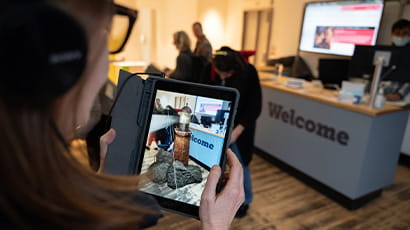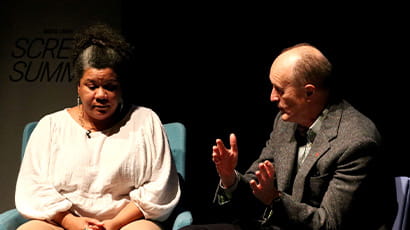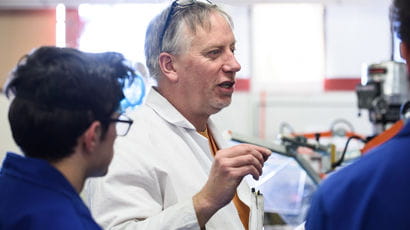World-first rubies grown in situ from waste materials
A UWE Bristol researcher looks set to transform the jewellery industry after successfully growing the world’s first ruby in situ, in a platinum ring.
Sofie Boons, a Senior Lecturer in Design Crafts at the University of the West of England (UWE Bristol), grew the gemstone from a ‘ruby seed’ – which can be produced from discarded gemstones or waste gemstone materials readily available in industry.
The jeweller-turned-scientist has spent the last four years developing the process to grow this waste material in situ in metal structures; she hopes to use her groundbreaking research to change negative attitudes towards lab-grown gemstones and make way for a new era of using urban mined gemstones.
Unlike gems grown from scratch in a lab, which can be energy-intensive, or gems mined unsustainably from the ground, these gems require a flux solution* to grow in a furnace from pieces of waste gem material or grit** – a process that takes just days.
The lab-grown gems are identical to mined ones, with the same structure and quality – the only difference is where they have been grown.

Sofie says: “This is a completely innovative and more sustainable process that could transform how jewellers incorporate gemstones in jewellery, a process that is literally outgrowing traditional practices. Usually with chipped gems, jewellers have to cut them even smaller before using them, which therefore lowers the value, but this process enables them to use waste gemstone material to grow gems as big as they need, in situ in metal structures. I hope this innovation will put an end to the long-shared narrative that lab-grown gems are ‘synthetic’ or less valuable than mined ones. After all, these neo-gemstones grow following the patterns set by nature, resulting in stunning natural facets, which each time a seed is grown will be different.
“In theory, we have enough material on the planet today to stop mining. By sharing this research, I hope to put power into the hands of jewellers, as the technique is simple enough for them to adopt – it’s not just for scientists. I’m looking forward to expanding the research, looking at other gemstone colours and growing in different metal structures.”
Professor Elena Marco, UWE Bristol’s Pro Vice-chancellor and Head of College of Arts, Technology and Environment, said: “Mining for gemstones has many environmental consequences, including soil erosion, deforestation and ecosystem destruction. The technique that Sofie has developed challenges the view of the mining industry that mined gems are superior and introduces a credible and more sustainable way of producing innovative jewellery pieces without the negative impact to the planet.
“As a university, we want to empower our students and staff to face and tackle climate and sustainability challenges, and support real-world research that can help to address climate change, biodiversity enhancement and the environment.”
Sofie’s work will be published next month as she concludes her PhD. She now plans to expand the research, supported with funding from a UWE Bristol Vice-Chancellor Early Career Researcher Development Award, testing the growth of multiple seeds simultaneously and growing in other metal structures, as well as test the growth of sapphire seeds with different colours in collaboration with the University of Bristol.
Last year, working in collaboration with Swiss company BREVALOR Sarl, she created jewellery pieces with the world’s first lab-grown glow-in-the-dark single crystal material.
Sofie's research was undertaken as a Crafts Council Research Fellow at the university’s Centre for Print Research (CFPR) and was funded through the Expanding Excellence in England (E3) fund by Research England.
*Fluxes are usually flowing agents - in this case it is a chemical used to lower the melting temperature of aluminium oxide (which is what ruby is made of).
** Grit is a term for small gemstone pieces often used for industrial tools.
Related news

28 August 2024
Funding opportunities and information events announced for 'Immersive Arts'
Immersive Arts, a UK-wide programme to support artists to make and share extraordinary immersive work, has unveiled its first round of funding opportunities.

13 February 2024
Funding secured to develop sustainable health-monitoring e-textiles
A UWE Bristol academic has been given a New Investigator Award to further develop wearable sustainable e-textiles to monitor heart patients.

09 November 2023
Region’s production community energised by crucial announcements during Screen Summit
The prospect of a regional production fund and news of a media conference coming to Bristol, were among the highlights of the Bristol and Bath Screen Summit.

08 November 2023
UWE Bristol researcher discovers identity of mystery figure on Led Zeppelin IV cover
The original of an image made famous by the band Led Zeppelin has been discovered in a Victorian photograph album by a UWE Bristol history researcher.

03 November 2022
Success for inaugural Bristol and Bath Screen Summit
Showcasing Bristol's city-region as a leading production community, the summit focuses on ways to nurture creative talent and support innovation and diversity.
You may also be interested in

Media enquiries
Enquiries related to news releases and press and contacts for the media team.

Find an expert
Media contacts are invited to check out the vast range of subjects where UWE Bristol can offer up expert commentary.






